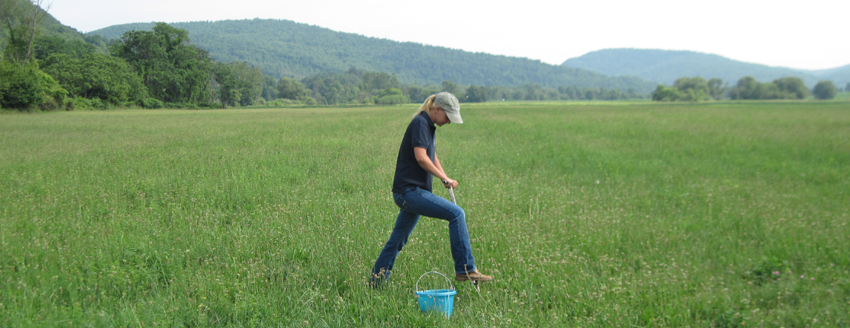Nutrient Management
 Nutrient Management Planning
Nutrient Management Planning
Understanding the importance of balancing nutrients will help farmers carry out their Nutrient Management Plans more effectively. A Nutrient Management Plan (NMP) maps out where, when, and how much manure can be spread on a farm with minimal risk of phosphorus and pathogens entering a water supply. By adhering to an appropriate manure-spreading schedule, high-risk practices can be eliminated.
WAC NMPs follow the USDA NRCS 590 standard and the New York Phosphorus Index. Planners work with WAC participants to create a plan that suits each individual farm based on the amount of nutrients managed, terrain and unique infrastructure of each farm.
Farms in the NYC watershed are soil sampled every 3 years, which provide the basis for a farm’s NMP. In addition to soil sample and manure sample analysis, a NMP also includes several farm maps which outline land use, soil data, field fertility, slope, flow paths, and manure spreading load and timing allowances. Nutrient Management Plans summarize the nutrient balances for each farm field, and provide recommendations on crop rotations and fertilizer inputs. The main goal of NM Planning is to help ensure that nutrients spread on farm fields are done so in a way that maximizes plant uptake and efficiency for crop production, while minimizing the risk for nutrient runoff and erosion.
Nutrient Management Credit (NMCredit)
Following a NMP can be difficult for some farms. To offset the additional time and cost it takes to implement a NMP, the Nutrient Management Credit (NMC) Program was created. NM Credit is an incentive program that rewards farmer’s willingness to spread manure according to a Nutrient Management Plan.
The NM Credit Program encourages heightened stewardship of manure resources to improve water quality and provides the Watershed Agricultural Program a means to enhance implementation of Nutrient Management Plans (NMPs).
Farmers eligible to enroll in the NMC program keep record of their manure management and turn in manure spreading records annually, at which time a group of peers reviews and approves each farms credit award. NM Credit balances are used to reimburse farmers for Nutrient Management related expenses. Eligible expenses include items such as manure spreaders, barn cleaners, custom services, and lime.
In 2020, farmers earned $10.00 per acre and around $12 per animal unit. 142 farms participated in the NM Credit Program and earned roughly $550,000 in credits that they can utilize to reimburse nutrient management related expenses.
Other Conservation Strategies
Additional forage system management practices for protecting water quality include, prescribes grazing plans, annual crop plans, lime application, and the use of cover crops. All of which can help maximize crop yields and conserve soil. Educational classes and tours are also offered regularly to help explain and demonstrate various crop management techniques.
Educational Tools:
Cover Crops Video
Soil Sampling Guide
NMC brochure (How Credit works)
Guide to Nutrient Management
Composting
On-farm Horse Manure Management
Prescribed Grazing Management: Rotational Grazing
Pasture Management: Paddock Management for Horses
Want more information on Nutrient Management?
Feel free to contact our NM Planning Staff with additional questions regarding Nutrient Management.
Paul Cerosaletti, MS, CCA
NMTeam & PFMTeam Leader
Cornell Cooperative Extension
Cindy McCarthy, CCA
NMTeam & PFM Coordinator
Watershed Agricultural Council
Brent McKeon
Nutrient Management Specialist
Watershed Agricultural Council
Nate Nero, CCA
Nutrient Management Specialist
Watershed Agricultural Council
Kari Sheridan, CCA
Nutrient Management Specialist
Watershed Agricultural Council
Ben Hepler, CCA
Nutrient Management Specialist
Cornell Cooperative Extension
Kim Holden
Administrative Assistant
Cornell Cooperative Extension
44 West Street
Walton, NY 13856
Phone: 607-865-7090
Fax: 607-865-5535
